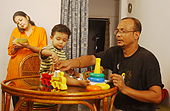 |
| MR MOM: Bijon Ray (seen here with wife Paroma and son Sufi) takes on a ‘woman’s job’. Photo: Subhendu Chaki |
If you walk along Central Road in Jadavpur, you will reach a large green pond, surrounded by trees. In a rented apartment on the ground floor of a three-storey house beside it, live Bijon Ray, his wife, Paroma, and their baby son, Sufi.
If you ring the doorbell to their house on any given weekday, during office hours, it is usually Bijon who answers it. He has a harried look about him, as though he is terribly busy with some household chore, which you have interrupted. He is, and you did. Bijon is a househusband.
It all began last year, when on February 12, the baby was born. That’s when Bijon dropped the bombshell. He announced to stunned members of his family that instead of his wife, Paroma, it would be he who would quit his job as executive producer of a Bengali news channel, and look after their newborn son. “You’ll be a househusband?” his mother had asked, incredulous. His father-in-law, an imposing, ex-government servant, sniggered first and then guffawed, patting him on the back, patronisingly, telling him to “reconsider your decision, my son!” Even his father, who is a patient of schizophrenia and rarely takes part any more in family decisions, tried to reason with him and dissuade him from “becoming a butt of all sorts of jokes”.
But Bijon had made up his mind. And his reason had more to do, he insists, with practicality, than trying to make a statement of any kind. “It was a question of one of us giving up our jobs, since we didn’t want our baby to be brought up by an outsider,” he explains. His parents don’t live in the city and his wife’s father, a widower, was an unlikely candidate for a baby-sitter. “I thought it was unfair to take it for granted that Paroma would quit her job just because she is the mother. She has spent as much time building up her career as I have done and I knew she didn’t want to leave everything and become a homemaker.”
Paroma, who works as HRD consultant for an American software development firm, Cognizant Technology Solutions, though a little hesitant at first, ultimately accepted the decision. “Initially, I was apprehensive because we are conditioned to think that only the mother can take care of a newborn baby properly,” says Paroma, explaining, “there was, first of all, the basic question of weaning the baby who was still being breast-fed”.
Also, a lot of people advised against it. The worst objections came from Bijon’s mother, who went to the extent of enumerating the details of what it would entail to bring up a kid. “You have to spend most of your time bent over the baby’s bottom, changing diapers,” she said, “and that would be the most pleasant part of the job”.
But Bijon had a ready reply: “If women have done it for ages,” he said, “men can do it too”. That was it. Paroma went back to work three months after their son was born and Bijon became a full-fledged househusband.
Not that it was by any means an easy feat. “It’s supposed to be the ultimate male fantasy to stay at home while someone else brings home the bacon,” laughs Bijon. “Not that everyone has the courage to do it. But those who do, will realise that it’s no bed of roses.”
For instance, to spare Paroma from having to get up each time the baby cries in the night, he has started doing it himself. “It’s terrible,” he says. “I too am usually exhausted from the previous day’s running around — bathing baby, heating milk for him, making sure he gets his meals on time and singing him to sleep.” And, of course, changing his diapers (what seems to him) a hundred times a day.
On some days, when the domestic help doesn’t land up, Bijon finds himself not only having to sweep, swab, dust and cook, but also wash dishes and of course, the baby’s clothes. All this is punctuated with frequent trips to the baby’s cot, to see why baby is suddenly bawling his lungs out. Or, if he is not, why not? Why is he so quiet? Has he swallowed something and is choking on it?
“All this has made me realise what women have been doing for centuries,” sighs Bijon. “It’s a thankless job. Everyone takes it for granted.” But Bijon soldiers on. When Paroma returns from work, he’s even waiting with a cup of tea.
“The perception has always been that because the father earns the money, his job is more important,” he says wrily. “When he comes home, he doesn’t usually bother helping out with household chores.”
But as his father had predicted, people find him kind of funny. “I’ve heard the maid gossip with other maids in the neighbourhood, calling me Sufi’s ‘Ma’,” he says. “It doesn’t bother me at all but it just goes to show the social conditioning at work.” Bijon has also noticed that his friends talk about him as though he is a ‘has-been’. “Taking a break to become a househusband seems to them to be a bad career move,” he says. “But no one realises that if I didn’t take the decision to stay at home, Paroma would have to.”
And most gratifyingly, Sufi, who is now a little older, and is beginning to walk, runs to his dad when he is hungry, sleepy or when he thinks he needs to change his diaper.
And his mom finds herself playing the role traditionally relegated to fathers: bringing home the goodies.











